
The Jolly Circus Quilt
Ruby Short McKim, July 27, 1891- July 1976
by Karen B. Alexander
"What is the compelling fascination of quilts?" is a question I hear frequently once someone discovers my passion for quilt history. One of the reasons I give is because quilt history is a natural vehicle for learning about the changing theories of social history and, more specifically, the changing tides of women's history. But quilts also have an amazing linking thread into the study of economics, trade and the industrial revolution. But it all really started with women's history for me.
Ruby Short McKim, the 33rd Inductee of The Quilters Hall of Fame, TQHF, was born into a time of great change for women, as was Marie Webster, in whose restored home TQHF is now headquartered. Marie was born in 1859, just as the American Civil War was about to fire its first shot. Ruby was born the year Marie turned 32. Interestingly enough, both women launched themselves into business just about the same time, only one was in her early 50s and the other not yet 20. They surely knew of each other but I am not aware that they ever corresponded with one another.
Ruby's father, Morris Trimble Short, was 47 when she was born and died when she was 10. Viola M. Vernon Short, her mother, was 24 years younger than her husband and a powerful role model in Ruby's life. Viola had already proven herself quite capable as a teacher prior to her marriage and as a missionary's wife following the family's move from Illinois to Missouri two year's before her husband's death. She was an avid promoter of children's education and believed that children should be allowed to make their own mistakes and then deal with the consequences. She had her own unique way of training her children how to manage their own meager resources that could well be used as a model today. I found this aspect of Ruby's childhood as described in Jill Sutton Filo's AQSG research paper particularly fascinating.

Jolly Circus Quilt
Ruby showed a very early interest in drawing and was known to carry a sketchbook with her everywhere to the point that some family and friends, Filo discovered, jokingly referred to it as part of her wardrobe. Her senior year of high school she served as art editor of the yearbook with twenty-five pages bearing her pen and ink sketches, harbinger of much artwork to come. At age 19 she headed for the New York School of Fine and Applied Arts in New York City where she studied while rooming with her married sister. The renowned Frank Alvah Parsons, pioneer in graphic design and commercial illustration, was joint administrator of the school the four years prior to Ruby's arrival and became the director during her one year of study, 1910-1911. Without a doubt, Parsons' philosophy had great impact on Ruby's artistic and entrepreneurial development. Parsons' influence was far reaching in American cultural history.

Quaddie Quiltie
Ruby returned home to Independence, MO, after only one year in New York. Although the reason is not known for certain, finances probably had a lot to do with it. Back home Ruby began to teach in the public schools and in 1912 became the Supervisor of Drawing for the Independence School system, overseeing all grades elementary through high school. Jill Sutton Filo's ground breaking research on McKim published in AQSG's Uncoverings 1996 reveals a delightful interview Filo conducted of a 93 year old former student and neighbor of Ruby's. Ruby was apparently an extremely popular teacher among her pupils.
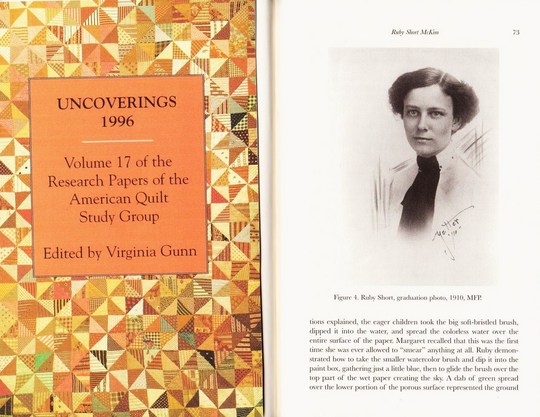
"Bedtime Quilt", or the "Quaddie Quiltie" series as it soon became known, launched Ruby's career on May 7, 1916 in the Kansas City Star. It was Ruby's first published series. Barbara Brackman writes in Women of Design: Quilts in the Newspaper that "the ‘Quaddy Quilties' ... are thought to be the first syndicated pattern series" as well.
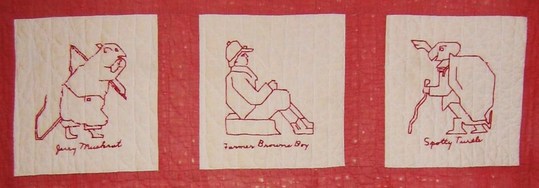
Quaddie Quiltie
The quilt from my collection whose blocks you see here bears only 9 of the 20 different patterns from this first series. A fabric tag on the back says: Carol Burr Baby quilt made for Richard born 1918. Although the red sashing is badly worn in places, especially across the top border, I was thrilled to stumble upon such an early copy of Ruby's first series.
This first series was a joint copyright venture with well known author Thornton Burgess, who died in 1965 at the age of 91, wrote over 170 books and 15,000 stories throughout his life. His characters, such as: Peter Rabbit, Joe Otter, Hooty the Owl, Jerry Muskrat, and Bobby Raccoon are famous worldwide. It was an auspicious beginning to Ruby's career to land this joint venture.

Quaddie Quiltie
After marriage and soon after the birth of her first child in 1918, Ruby's career resumed with she and husband Arthur often on the road visiting with publishers in an effort to build relationships that would help increase her syndication network. While away on business, Ruby often wrote home to the grandparents, who were caring for Betty, and sketched delightful scenes of children busy at play or work as she had witnessed or imagined them while on her trips. A second daughter was born in 1924 and a son in 1935. The family kept Ruby's letters and sketches and treasure them today.
In 1921, Woman's World presented her whimsical angular Jolly Circus Quilt and offered pre-stamped kits.

The Jolly Circus Quilt
I was very fortunate to stumble across a summer spread made from this pattern a few years ago. It is the only example of this pattern that I have personally seen, though I have seen photos of other examples. Though it has no holes, it had apparently hung in an antique shop for a good long while and its muslin background on which the embroidery is done is greatly discolored.
In spite of all the modern forms of entertainment that have come along to distract all of us since my childhood, it is still the memory of the news "The circus is coming to town!" that stirs the some of the most anticipatory memories of childhood - that and Christmas Eve of course. There was truly something magical about the circus in the late 1940s and early 50s before our culture had become so saturated with more sophisticated forms of entertainment.

The Jolly Circus Quilt
With the wide spread exposure of her more distinctive designs, Ruby's efforts soon evolved into a mail-order business. From her pen would flow a veritable flood of some 20 embroidery and quilt patterns that were syndicated in various publications as she competed for space with the Nancy Page Quilting Clubs during the 20s and 30s. Her 16-year association with Child Life began in 1922. According to Jill Filo, Ruby's Nursery Rhyme series was the vehicle of one of the earliest recorded children's quilt contests as seen in Ohio's Sunday Cleveland Plain Dealer in 1922. Filo also articulated in her nomination letter of Ruby to The Quilters Hall of Fame, "The 1926 Colonial History Quilt, an American Sesquicentennial celebration, instigated the January, 1927 "Old-Time Quilts" show and contest in Seattle, Washington sponsored by the Post-Intelligencer. A few weeks before the stock market crash, the 1929 Flower Garden Quilt contest set the stage for the 1930 Indianapolis Star's two and a half day quilt show which attracted 468 quilts and 14,004 visitors..." In addition, the near-by Marion Chronicle in Grant County sponsored its first public show judged by none other than Marie Webster herself, Marion's leading quilt expert and a nationally known quilt designer and author in her own right at that time.

The Audubon Bird Life Quilt
As the popularity of syndicated quilt pattern series grew, more and more newspapers held contests and exhibits of the best completed quilts, which in turn generated more and more publicity and business for quilting supplies and patterns. One could say that McKim helped begin the tradition of the modern merchandizing of quilting long before the late 20th century quilt revival took off and took it to an even higher level with its seemingly endless array of tools and gadgets.

The Audubon Bird Life Quilt
Successful Farming ran five of Ruby's features from 1922-1928 with Ruby selling transfer patterns for the first time in this publication in November 1928. How much more could this amazingly productive woman juggle? For starters, she began writing her "Adventures in Home Beautifying" column January 1928 for Better Home and Gardens magazine, focusing on a different room of the house each month. That same year she and her husband Arthur founded McKim Studios in Independence, Missouri, which soon became a successful mail-order needlework supply and pattern business.
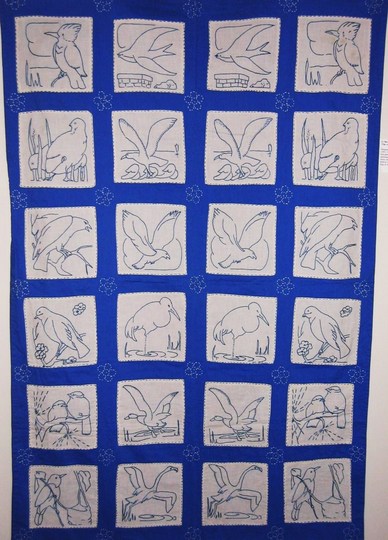
The Audubon Bird Life Quilt
Although Ruby's first patterns appeared in the Kansas City Star in 1916, it wasn't until September 1928 that Ruby became a key player in the launch of the Kansas City Star's continuous quilt pattern series, beginning with her traditional Pine Tree pieced pattern. This was the beginning of a 33-year tradition by the KCS newspaper of offering full-size quilt patterns, although Ruby herself would stay involved only until September 20, 1930, at which time Eveline Foland took over.
Ruby's self-published 1931 book, 101 Patchwork Patterns, one of the earliest quilt pattern anthologies that had detailed instructions, was a natural next step in the progression of her career. It's still considered a classic and revised reprints are readily available, but it's far more fun to track down a copy of the original hard back shown here.
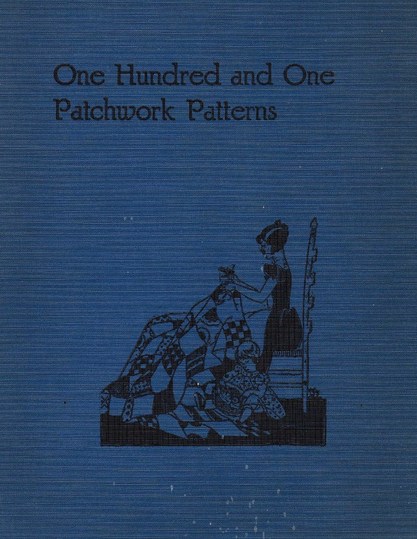
The book cemented Ruby's place as one of the giants of early 20th century quilt history. As the Dayton Daily News declared Oct 2, 1932, "wherever quilts and quilt patterns are known, the name of ‘McKim Studios' is as famous as the name Tiffany is famous in the diamond world." Ruby was included in the first edition of Who's Who Among American Women and her influence on American quilting continues unabated, as her patterns enjoy still another revival in the 21st century.
The old McKim's Studio eventually became Kimport Dolls' business residence. Together Ruby and Arthur once again worked as a team until Arthur's death in 1967. The doll business continued approximately 10 more years and ended not long after Ruby's death in 1976. In 2006 the site of the old McKim Studios in Independence, Missouri became Woodstock Inn Bed & Breakfast. It has been exciting to see Ruby's two granddaughters take on the challenge of carrying on Ruby's legacy by re-issuing her designs and even creating them in some new form. Be sure to visit Ruby's Legacy and the resurrected McKim Studios. They have also been encouraging and assisting the Jackson County Historical Society to begin the process of collecting the historic ephemera to McKim Studios' design and business history.
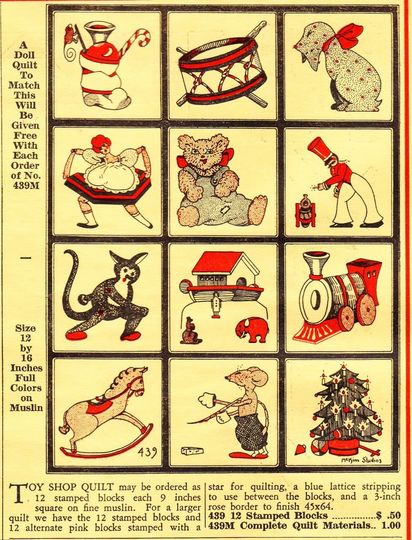
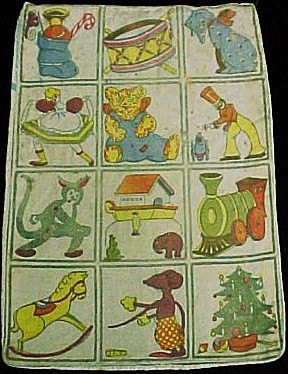
The Toy Shop Window Quilt pattern, 1933
List of SERIES QUILTS by Ruby Short McKim
This is a "work in progress" list and input is greatly appreciated.
Coded items are from the new McKim Studios series as created by Ruby's Granddaughter
1916 - QUADDY QUILTIE BOOK • Item #QS 204
Originally offered by Ruby Short Published in 1916
1916 - MOTHER GOOSE
1922 - NURSERY RHYME QUILTIE BOOK • Item #QS 202
Originally offered by Ruby Short McKim Pub in 1922
1923 - ALICE IN WONDERLAND
1923 - BETTY BLUE & BOBBY SHAFTOE
1923 - ROLY POLY CIRCUS QUILT BOOK • Item #499
Originally offered by Ruby Short McKim Published in 1923
1924 - CHILD LIFE
1926 - PETER PAN QUILT BOOK • Item #QS 201
Originally offered by Ruby Short McKim Published in 1926
1926 - COLONIAL LIFE
1927 - BIBLE HISTORY QUILT BOOK • Item #400
Originally offered by Ruby Short McKim Pub in 1927
1928 - AUDUBON SERIES
1929-30 - FLOWER GARDEN QUILT BOOK • Item #401
NOTE: Includes patterns for alternate quilting block and border
Originally offered by Ruby Short McKim Published in 1929-30
1930 - FARM LIFE QUILT BOOK • Item #403
NOTE: Includes patterns for alternate quilting block and border
Originally offered by Ruby Short McKim Pub in 1930
1930 - BONNET BABIES
1930 - PATCHWORK QUILT
1931 - PARADE OF STATES
1931 - STATE FLOWERS QUILT BOOK • Item #QS 205
Originally offered by McKim Studios Published in 1931
1932 - FRUIT BASKET
1933 - TOY SHOP WINDOW QUILT BOOK • Item #439
NOTE: Includes pattern for alternate quilting block
Originally offered by McKim Studios Published in 1933
1933 - WILDWOOD FLOWERS QUILT BOOK • Item #QS 203
NOTE: Includes pattern for alternate quilting block
Originally offered by McKim Studios Published in 1933
1934 - THREE LITTLE PIGS QUILT BOOK • Item #481
NOTE: Includes border pattern
Originally offered by McKim Studios Published in 1934
1934 - FLOWER BASKET
1935 - RHYMELAND QUILT BOOK • Item #QS 207
Originally offered by McKim Studios Published in 1935
1937 - AMERICAN SHIPS QUILT BOOK • Item #QS 206
Originally offered by McKim Studios Published in 1937




.jpg)

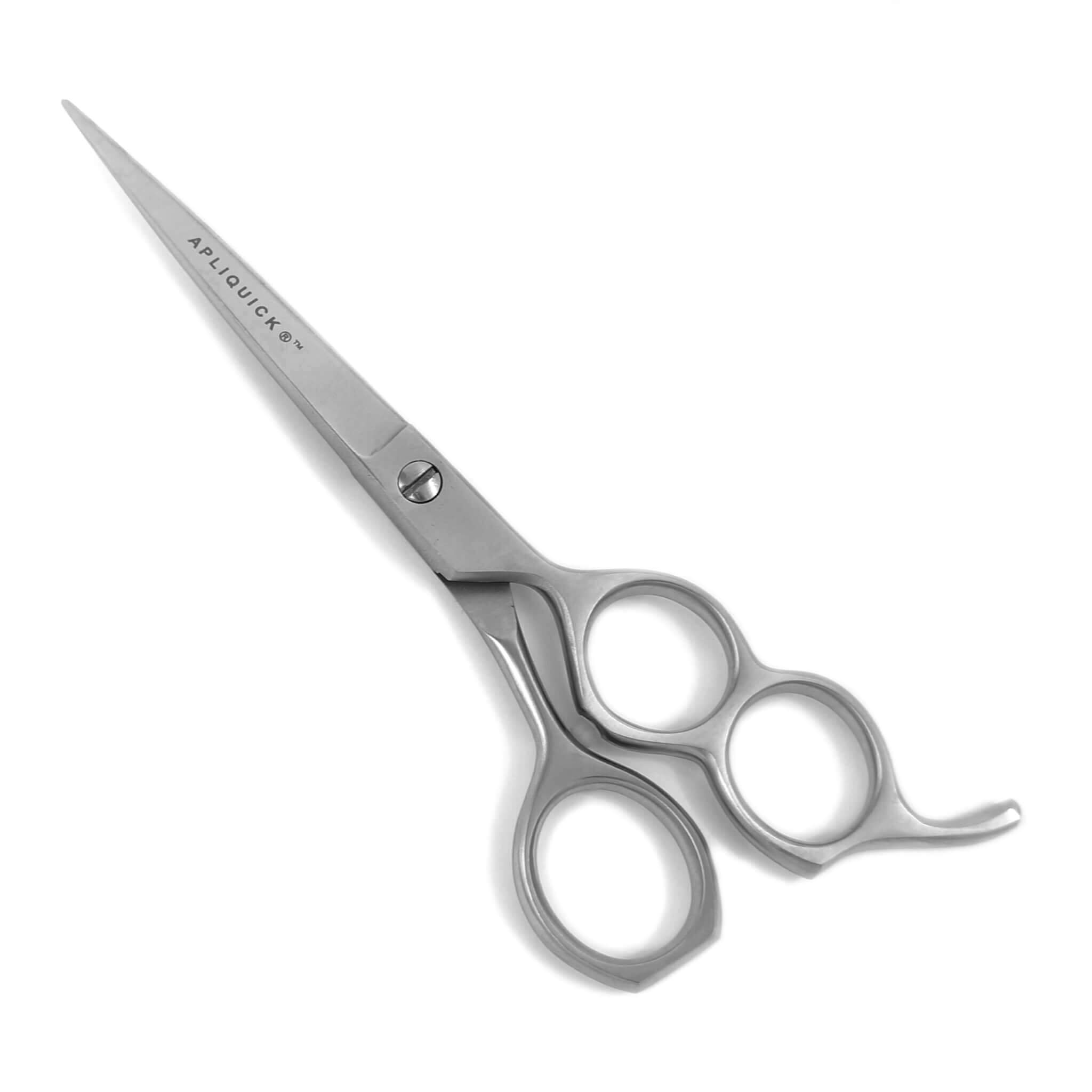

RSS feed for comments to this post